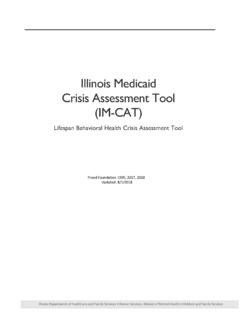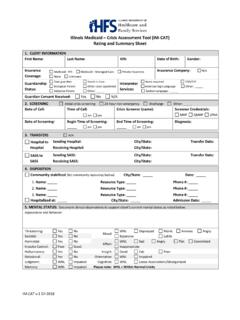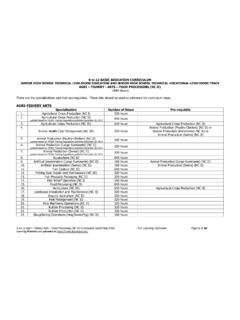Transcription of Illinois Medicaid Comprehensive Assessment of Needs and ...
1 Illinois Departments of Healthcare and Family Services Human Services, Division of Mental Health Children and Family Services REFERENCE GUIDE Illinois Medicaid Comprehensive Assessment of Needs and Strengths (IM+CANS) Comprehensive Multisystem Lifespan Assessment Updated: 8/1/2018 Illinois Medicaid - Comprehensive Assessment of Needs and Strengths (IM+CANS) 2 ACKNOWLEDGEMENTS A large number of individuals have collaborated in the development of the Illinois Medicaid Comprehensive Assessment of Needs and Strengths (IM+CANS). Along with the various Child and Adolescent Needs and Strengths (CANS) and Adult Needs and Strengths Assessment (ANSA) versions for mental health, developmental disabilities, juvenile justice, and child welfare, this information integration tool is designed to support individual case planning and the planning and evaluation of service systems. The IM+CANS is an open domain tool for use in service delivery systems that address the Needs and strengths of children, adolescents, adults, and their families.
2 The copyright is held by the Praed Foundation to ensure that it remains free to use. Training and annual certification is required for appropriate use. Literary Preface/Comment regarding gender references: We are committed to creating a diverse and inclusive environment. It is important to consider how we are precisely and inclusively using individual words. As such, this reference guide uses the gender-neutral pronouns they/them/themselves in the place of he/him/himself and she/her/herself. Additionally, individual is being utilized in reference to child, youth, adolescent, young adult or adult. This is due to the broad range of ages to which this reference guide applies. The IM+CANS is the result of a collaboration between the Illinois Departments of Healthcare and Family Services (HFS), Human Services-Division of Mental Health (DHS-DMH), and Children and Family Services (DCFS). For more information on the IM+CANS contact: Healthcare and Family Services (HFS) (217) 557-1000 201 S.
3 Grand Avenue East Springfield, IL 62763 For specific permission to use this tool, please contact the Praed Foundation: John S. Lyons, PhD Senior Policy Fellow Chapin Hall at the University of Chicago 1313 East 60th Street Chicago, IL 60637 April D. Fernando, PhD Policy Fellow Chapin Hall at the University of Chicago 1313 East 60th Street Chicago, IL 60637 Praed Foundation Illinois Medicaid - Comprehensive Assessment of Needs and Strengths (IM+CANS) 3 TABLE OF CONTENTS 2 INTRODUCTION .. 5 History and Background of the CANS and History .. 6 Measurement Properties .. 6 Rating Needs & Strengths ..7 Six Key principles of a Communimetric Tool ..9 How is the IM+CANS Used?..9 It is an Assessment Strategy .. 9 It Guides Care and Planning .. 9 It Facilitates Outcomes Measurement .. 9 It is a Communication 9 IM+CANS: A Strategy for Change .. 10 Making the best use of the CANS.
4 10 Listening using the CANS .. 10 Redirect the Conversation to Parents /Caregivers Own Feelings and Observations .. 11 Acknowledge Feelings .. 11 Wrapping it Up .. 11 REFERENCES ..12 IM+CANS Basic Structure & Core Items ..13 IM+CANS Core Items .. 13 Caregiver Addendum .. 14 DCFS Addendum .. 14 IM+CANS CORE: DOMAINS AND DESCRIPTIONS OF ITEMS ..15 I. Potentially Traumatic/Adverse Childhood Experiences (ACEs) ..15 II. BEHAVIORAL/EMOTIONAL Needs ..19 II. [A] Traumatic Stress Symptoms III. LIFE FUNCTIONING DOMAIN ..37 III. [B] Developmental Disabilities Module ..53 III. [C] School/Preschool/Daycare Module (Age 0-21) ..57 III. [D] Vocational and Career Module (Age 16+) ..60 III. [E] Parenting/Caregiving Module (Age 16+) .. 600 III. [F] Independent Activities of Daily Living Module (Age 16+) ..66 IV. RISK IV. [G] Runaway Module ..77 IV. [H] Sexually Problematic Behavior IV. [H1] Sexually Aggressive Behavior Sub-Module ..83 IV. [I] Dangerousness Module.
5 86 IV. [J] Fire Setting Module ..90 Illinois Medicaid - Comprehensive Assessment of Needs and Strengths (IM+CANS) 4 IV. [K] Justice/Crime Module ..94 II. [L] Substance Use Module ..97 V. CLIENT STRENGTHS .. 100 VI. CULTURAL FACTORS .. 109 IM+CANS CAREGIVER ADDENDUM .. 112 I. Caregiver Resources & Needs Domain .. 112 IM+CANS DCFS INVOLVED YOUTH ADDENDUM .. 124 1. [H2] Sexually Agressive Behavior Sub-Module Additional DCFS Youth 124 II. Parent/Guardian Safety Concerns .. 126 III. Parent/Guardian Wellbeing Concerns .. 128 IV. Parent/Guaridan Permanence Concerns .. 131 V. Substitute Caregiver Commitment to Permanence .. 133 VI. Intact Family Services Module .. 135 VII. Intensive Placement Stabilization Services (IPS) Module .. 138 APPENDICES .. 141 Illinois Medicaid - Comprehensive Assessment of Needs and Strengths (IM+CANS) 5 INTRODUCTION THE Illinois Medicaid - Comprehensive Assessment OF Needs AND STRENGTHS: Comprehensive MULTISYSTEM LIFESPAN Assessment The Illinois Medicaid Comprehensive Assessment of Needs and Strengths (IM+CANS) serves as the foundation of Illinois efforts to transform its publicly funded behavioral health service delivery system.
6 It was developed as the result of a collaborative effort between the Illinois Departments of Healthcare and Family Services (HFS), Human Services-Division of Mental Health (DHS-DMH), and Children and Family Services (DCFS). The Comprehensive IM+CANS Assessment provides a standardized, modular framework for assessing the global Needs and strengths of individuals who require mental health treatment in Illinois . Today, the IM+CANS incorporates: A complete set of core and modular CANS items, addressing domains such as Risk Behaviors, Trauma Exposures/Adverse Childhood Experiences (ACEs), Behavioral/Emotional Needs , Life Functioning, Substance Use, Developmental Disabilities, and Cultural Factors; A fully integrated Assessment and treatment plan; A physical Health Risk Assessment (HRA); and, A population-specific addendum for youth involved with the child welfare system. At the core of the IM+CANS is the Child and Adolescent Needs and Strengths (CANS) and the Adult Needs and Strengths Assessment (ANSA), communimetric tools that contain a set of core and modular items that identify an individual s strengths and Needs using a 0 to 3 scale.
7 The items support care planning and level of care decision-making, facilitate quality improvement initiatives, and monitor the outcomes of services. Additional data fields were added to the CANS items to support a fully Integrated Assessment and Treatment Plan (IATP), placing mental health treatment in Illinois on a new pathway built around a client-centered, data-driven approach. The IM+CANS also includes a Health Risk Assessment (HRA), developed to support a holistic, wellness approach to Assessment and treatment planning by integrating physical health and behavioral health in the Assessment process. The HRA is a series of physical health questions for the individual that is designed to: 1) assess general health, 2) identify any modifiable health risks that can be addressed with a primary health care provider, 3) facilitate appropriate health care referrals as needed, and 4) ensure the incorporation of both physical and behavioral health Needs directly into care planning.
8 The IM+CANS is one part of a broader toolkit of linked assessments, developed to meet the unique Needs of multiple public payer systems while also breaking down barriers to accessing behavioral health treatment. The IM+CANS is designed to reduce the duplicate collection of administrative and clinical data points needed to appropriately assess a client s Needs and strengths, while establishing a commonality of language between clients, families, providers, and payer systems. HISTORY AND BACKGROUND OF THE CANS AND ANSA The Child and Adolescent Needs and Strengths (CANS) and the Adult Needs and Strengths Assessment (ANSA) are multi-purpose tools developed to support care planning and level of care decision-making, to facilitate quality improvement initiatives, and to allow for the monitoring of outcomes of services. These tools were developed from a communication perspective in order to facilitate the linkage between the Assessment process and the design of individualized service plans, including the application of evidence-based practices.
9 The IM+CANS, similar to the CANS and ANSA, gathers information on an individual and their parent/caregiver s Needs and strengths, when appropriate. Strengths are the individual s assets: areas of life where they are doing well or have an interest or ability. Needs are areas where an individual requires help or serious intervention. Care providers use an Assessment process to get to know the child, youth or adult client and families with whom they work and to understand their strengths and Needs . The IM+CANS helps care providers decide which of an individual s Needs are the most important to address in treatment or service planning. The IM+CANS also helps Illinois Medicaid - Comprehensive Assessment of Needs and Strengths (IM+CANS) 6 identify strengths, which can be the basis of a treatment plan. By working with the individual and family during the Assessment process and talking together about the IM+CANS, care providers can develop a treatment or service plan that addresses an individual s strengths and Needs while building strong engagement.
10 The IM+CANS is made up of domains that focus on various areas in an individual s life, and each domain is made up of a group of specific items. There are domains that address how one functions in everyday life, on specific emotional or behavioral concerns, on risk behaviors, on strengths and on skills needed to grow and develop. There is also a section that asks about the caregiver s beliefs, preferences, and general family concerns. The provider, in collaboration with the child, youth, adult client and family, gives a number rating to each of these items. These ratings help the provider, individual and family understand where intensive or immediate action is most needed, and also where an individual has assets that could be a major part of the treatment or service plan. The IM+CANS ratings, however, do not tell the whole story of an individual s strengths and Needs . Each section in the IM+CANS is merely the output of a Comprehensive Assessment process and is documented alongside narratives developed by the care provider, individual and family that can provide more information about the individual.






